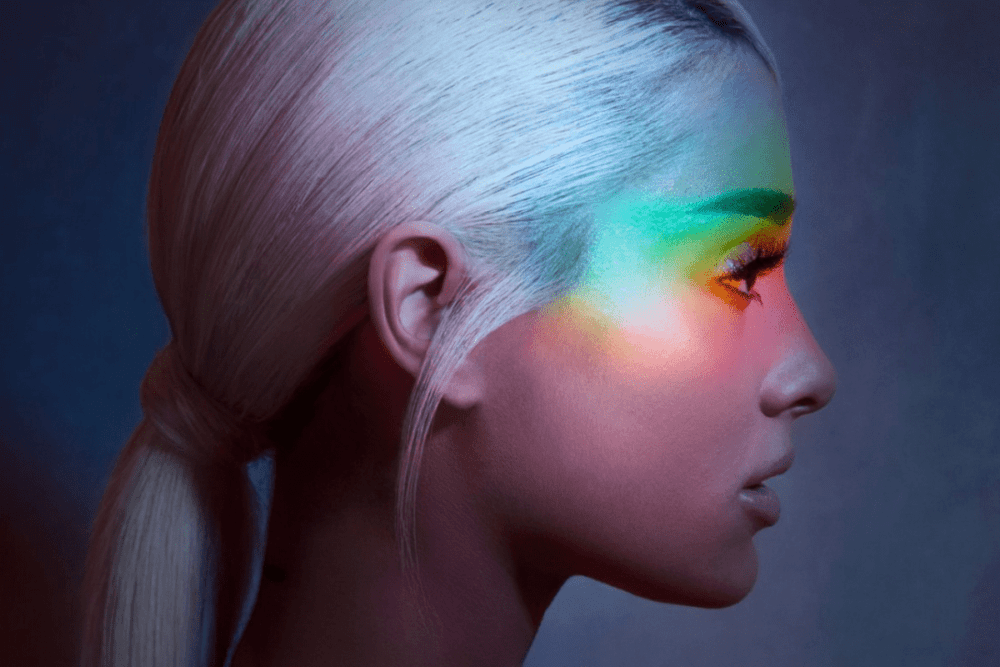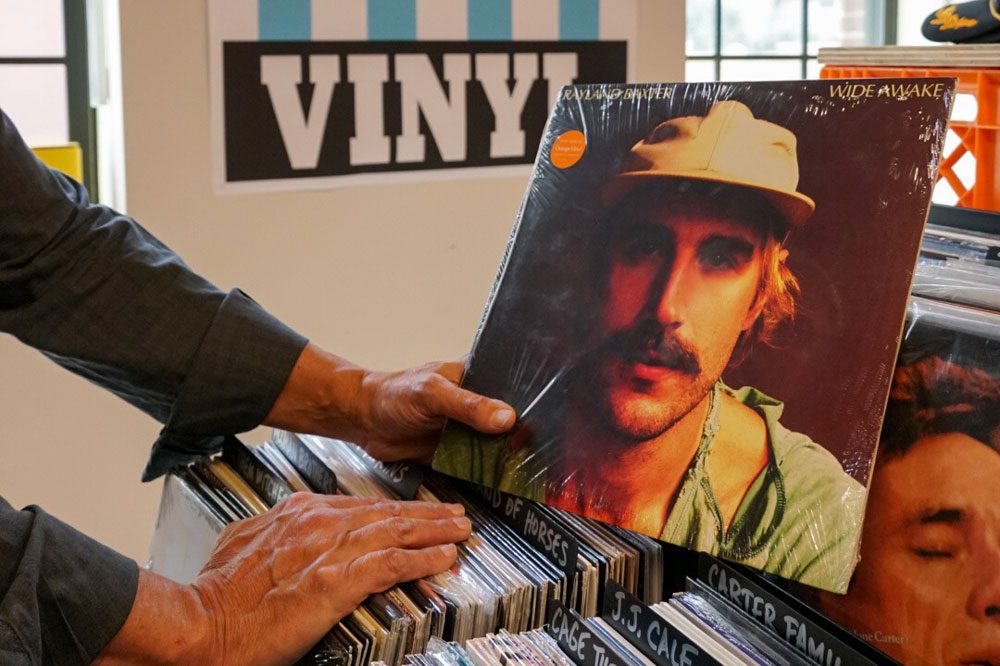
ONLY NOISE explores music fandom with poignant personal essays that examine the ways we’re shaped by our chosen soundtrack. This week, Rachel Cromidas explores the healing power of Ariana Grande’s most recent pop smash.
I never thought I’d be walking around my neighborhood on a Sunday afternoon singing, “I’m so fucking grateful for my ex,” but Ariana Grande will do that to a girl. That’s the catchy power of “thank u, next” – the surprise single the pop force of nature dropped last fall in the wake of her very public breakup with Saturday Night Live comedian Pete Davidson.
Everyone has their problems, and mine is that I Google people I don’t know way too much. I devotedly tracked Grande’s relationship arc with Davidson (and before him, rapper Mac Miller, who died of a drug overdose in August) with much more than the passing interest I’d otherwise take in celebrity gossip. This past year I also dated an active alcoholic, and then rebounded with a person in recovery. And while the comparison of my life to Grande’s fully ends there, I couldn’t help but view her ongoing statements about Davidson, Miller, and her own emotional distress through the lens of my experiences in Al-anon. It’s a 12-step program, similar to Alcoholics Anonymous, that helps people who love alcoholics find peace, whether or not their person has stopped drinking.
Most people have heard of AA, but fewer are familiar with Al-anon. Much in the same way that many alcoholics find sobriety with the support of a 12-step program, Al-anon is founded on the idea that it can be sad, scary, and painful to have an alcoholic family member or partner. And many Al-anons decide to go through their own process of recovery and healing, after recognizing they’ve been harmed by someone else’s drinking, as Grande herself has alluded. That’s certainly how I felt this past summer when, reeling from a confusing breakup with a man who’d said he was an alcoholic, but did not want to stop drinking, I started going to 12-step meetings.
In that problematic way that the celebrity gossip mill can convince us that the personal life of a 25-year-old pop star is any of our business at all, I read Grande’s tweets and scoured the lyrics on Sweetener for clues as to whether she was in the program herself—and whether she even saw herself as needing her own recovery from the pain of being in love with people who have struggled with substance abuse. Now, after “thank u, next,” I have to say that Ariana Grande is my favorite Al-anon, even if she didn’t intend to write an Al-anon anthem.
That’s because “thank u, next,” is very much a song about recovery—particularly regaining a sense of dignity, gratitude, and self-love after dark times. It’s about finding yourself again and learning how to cope with pain and trauma, not in spite of your crappy ex-boyfriends, but because of them. It’s a wild idea.
With its curt, Internet-shorthanded title that in a parallel universe would be the perfect title for a sarcastic diss track, it’s tempting to view the song as insincere, and the timing of its release – minutes before the weekly airing of SNL – as too on the nose. Or to note, cynically, that, like many of Grande and Davidson’s statements throughout their relationship, it’s meant to fuel a fantasy and capitalize on public fascination. And in some ways, “thank u, next” is selling a fantasy—one in which Ariana is calm, joyful and thriving in the face of a broken engagement and a loved one’s tragic death—when realistically, most people would be an utter mess in her position. But fantasy or not, her voice is beautiful and the song is a total earworm, and I’d argue that there’s enormous power in its repetitive chorus. In the same way I go to meetings every week, where we always recite the same Serenity Prayer and re-read the 12 Steps, I’d like to believe that humming along to the earnest chorus of “thank u, next” might really turn me into the kind of person who can move on with grace and gratitude.
When it comes to exes, conventional wisdom has it that living well is the best revenge. But there’s nothing vengeful in Grande’s insistence that she is thankful for the men she’s dated and that she’s learned meaningful lessons from each failed relationship. “One taught me love / one taught me patience / and one taught me pain,” Grande sings. Pain—whether it’s referring to heartbreak or the emotional weight of knowing you can’t save your partner, or stop them from hurting themselves—that’s the moment in the song when my mind jumps to anger over the times I watched my own ex use drugs and alcohol. But there’s no bitterness in it for Grande: “Now, I’m so amazing,” she concludes.
Being in awe of herself? That’s way better than trying to “win” a breakup. I cringe now to think of the selfies I’ve posted in the wake of my relationship ending, in service of appearing hot and fun and over it all to a person with arguably much bigger problems than mine. To think – all those Taylor Swift lyrics I’ve narrowly stopped myself from morosely subtweeting! What could have easily become another song about men who weren’t good enough (looking at you, Tay) quickly transforms into an anthem of radical self-love instead. That’s something we could all use more of after a breakup, but the sentiment becomes especially powerful in “thank u, next,” knowing that it comes from a young woman whose pain is tied up in having watched someone she loved fight and lose his battle with addiction and self-harm.
Grande has already had to answer to harsh attacks in the wake of Mac Miller’s death, staring down the toxic assumptions that many women face when a partner or ex is struggling with substance abuse. There’s the pressure to stay in a relationship that isn’t working, thinking that your presence could help or even save that person. And then there’s the dangerous tendency to blame the partners of addicts, especially women, when their partners act out.
When Mac Miller totaled his car and got a DUI in May for example, just over a week after Grande broke up with him, many people on social media accused her of being responsible. The young pop star spoke like a seasoned woman in recovery with a Twitter reply to one fan, who bluntly wrote that “Mac Miller totalling his G wagon and getting a DUI after Ariana Grande dumped him for another dude … is just the most heartbreaking thing happening in Hollywood.”
“I have cared for him and tried to support his sobriety & prayed for his balance for years (and always will of course) but shaming / blaming women for a man’s inability to keep his shit together is a very major problem,” she replied, defending her choice to end the “toxic” relationship. “Of course i didn’t share about how hard or scary it was.”
In this context, the second verse of “thank u, next” becomes a blueprint for recovery, as Grande celebrates choosing to cultivate self-love and self-worth. “I met someone else / We havin’ better discussions,” Grande writes, tongue-in-cheek, about spending more time with—wait for it—herself. “Her name is Ari,” she reveals a moment later, singing, “she taught me love / she taught me patience / how she handles pain / that shit’s amazing.”
Loving an alcoholic is a major lesson in better and worse ways to handle pain. I’ve likened it to playing a game of Clue that refuses to end, even when you’re just trying to do something as simple as have dinner, or meet up with friends. You could look for explanations and excuses for why the alcoholic is often running late, acting strange, lying, picking fights, nodding off during conversations, or worse. You could become suspicious and paranoid; you could upend your life trying to predict, plan for, and control the alcoholic’s drinking or drug use. But, after a year of loving a problem drinker, I realized that the answer to the mystery whodunnit was always, disappointingly, the same: It was my lover, with the bottle of whiskey, in the kitchen, in the study, in the bedroom, on and on and on.
Loving alcoholics, whether they’re drinking or not, can make you crazy; it’s frighteningly easy to lose yourself in the need to fix their problems. I don’t know if that was anything like Grande’s relationship with Mac Miller, or if her relationship with Davidson was notably better. But, days after Mac Miller died from an accidental overdose of a lethal mix of fentanyl, cocaine and alcohol, Grande wrote this on Instagram in tribute to the deceased musical artist: “i’m so sorry i couldn’t fix or take your pain away. i really wanted to.”
Many of the Al-anons I know can relate; we say we made it our missions to fix the alcoholics in our lives, and our self-esteem tanked when we realized we couldn’t. We say that a big part of our recovery is figuring out who we are, what our strengths are, how we can be of service to others, without causing harm, without losing ourselves in someone else’s disease. We say recovery isn’t linear—it might look like leaving the alcoholic and then going back; it might look like quickly rebounding with a comedian who’s no stranger to addiction, and then getting engaged to him, and then breaking it off, all in a whirlwind of inextricable distress and elation.
And some of us are a little bit obsessed with “thank u, next.” It’s got us and probably thousands of other people running around town singing about how grateful we all our for our exes, after all. That’s unreal. That’s not something I could have said before the 12-step program, even in the form of someone else’s song. And it’s not something I would have believed, necessarily, if I couldn’t imagine a bit of what Grande has been through over the past few years.
For me, the clarity I needed to understand how much my ex’s substance use was hurting me came from meetings. For Grande, it sounds like therapy has been key. After one fan jokingly tweeted “who is ariana’s therapist and are they accepting new clients,” Grande tweeted back this ringing endorsement of seeking professional help: “therapy has saved my life so many times … u don’t have to be in constant pain & u can process trauma. i’ve got a lot of work to do but it’s a start to even be aware that it’s possible.”
It’s not therapy, but “thank u, next,” also offers a way forward, a start. Infinitely memeable, (is that a requirement to become a top song these days?) “thank u, next” might be the healthiest Internet trend I know. It raises the question of what comes next, in a life of recovery, (and for some, a life of sobriety) and offers this answer: the person who has to come next is you.




